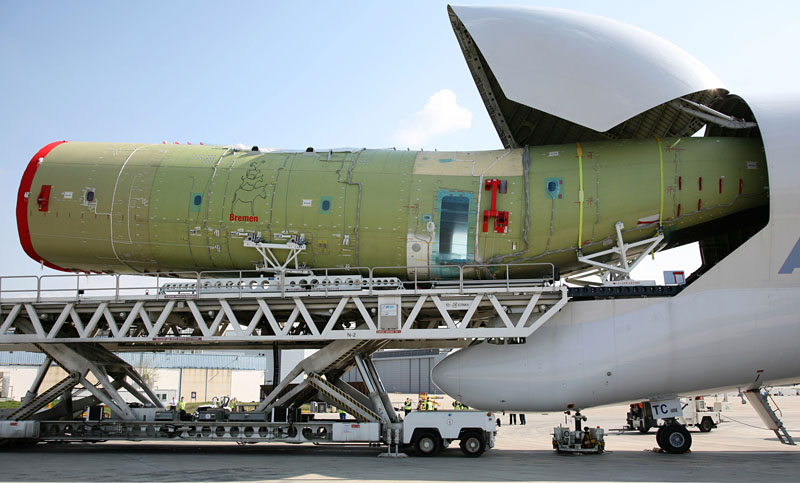A400M Project Highlights European Defense Paradox
France and Germany have decided to wait another six months before determining the fate of the troubled A400M military transport plane.
A400M Project Highlights European Defense Paradox
Soeren Kern | World Politics Review | June 19, 2009
The €20 billion project, which is Europe’s biggest collaborative defense program and is intended to replace the aging airlift capacity of European militaries, has been marred by technical problems and is now three years behind schedule and nearly €6 billion over budget. The original contract for the A400M was signed in 2003 and called for the delivery of 180 aircraft to seven partner nations starting in 2009. But Airbus, the plane maker owned by EADS, missed a March 31 deadline for A400M’s first test flight. By failing to achieve that milestone, Airbus is now technically in default of the contract.
In April, the partner nations agreed to a three-month moratorium in order to renegotiate the project. By extending that moratorium by another six months, France and Germany, which account for 110 of the 180 aircraft orders by European buyers, have sparked hopes that the A400M can be rescued. But that is by no means certain. A pullout by any one of the major partners could cause the entire project to collapse because it would increase the financial burden on the others.
Britain, which is desperate to modernize its military airlift capability, has publicly threatened to abandon the A400M project because even in the best case scenario the Royal Air Force (RAF) will not receive the A400M before 2013 or put it into service before 2014. In February, a House of Commons Defence Committee report said Britain should ditch the A400M because of the delays. Britain, which is trying to slash £2 billion from the 2010 defense budget by cracking down on troubled procurement programs, has already tried to pull out of another costly pan-European defense project, the Eurofighter.
The exploding costs of mammoth big-ticket defense items like the A400M, coupled with rising expenditures on military missions in Afghanistan and elsewhere (not to mention the global financial crisis), are tearing many European defense budgets apart at the seams. In Britain, for example, the Ministry of Defense recently revealed that fewer than one in three of the Army’s billion pound fleet of Apache attack helicopters is “fit for purpose” for front line operations. At the same time, just half of its fleet of Chinook transport helicopters and Hercules transport aircraft are in operational condition. The ministry has also has cut military training exercises in half in order to save money and rest exhausted troops. And the Chief of the Air Staff recently said that rationalization in the British armed forces would lead to the RAF running all combat jet operations, effectively neutering the Royal Navy’s maritime air force.
In Spain, the financial crisis, a deep recession and budget cuts has contributed to a situation in which three of the country’s four submarines are out of order, a state of affairs that is not expected to improve until late 2013, when the Spanish Navy takes delivery of new vessels. At the same time, cuts in patrols are leaving the long Spanish seaboard – a main European entry point for cocaine and hashish from Latin America – open for drug smugglers.
In Germany, the elite GSG-9 commando force recently abandoned a plan to rescue hostages and a German freighter captured by pirates in Somalia because it lacked the logistics for operations beyond German borders. Although the German military, the Bundeswehr, has a logistics capability, it lacks a sufficient number of readily deployable special operations forces and there is no inter-operability between the two organizations. Meanwhile, German troops in Afghanistan have been powerless to prevent the Taliban from closing six girls’ schools in the northern region of Kunduz. The education of Afghan girls has been a much-celebrated post-Taliban achievement for the international community, but the German Army says it cannot protect the schools.
One of the main arguments used to justify major pan-European defense projects like the A400M has been that by combining efforts, individual European countries could take advantage of economies of scale in order to reduce defense expenditures while at the same time increasing their defense capabilities. But the opposite seems to be happening. Indeed, the costs associated with these projects are draining so many resources that European countries are unable to successfully complete even the most basic of military missions.
Paradoxically, it is the global economic crisis that will probably end up saving the A400M. As recession-wracked Britain and Germany prepare for general elections in the coming year, politicians are thinking twice about the consequences of cancelling a project that supports some 40,000 high-technology jobs across Europe. In the meantime, Britain and France are looking to the US-built C-130J Super Hercules transport plane to fill the capability gap.
Originally published by World Politics Review on June 19, 2009.




